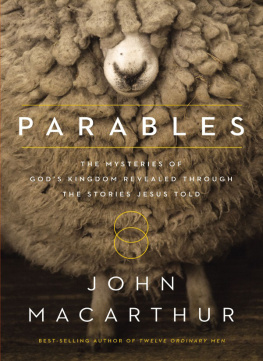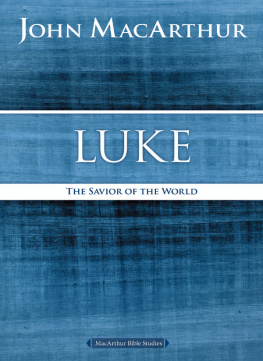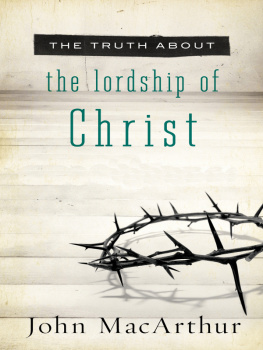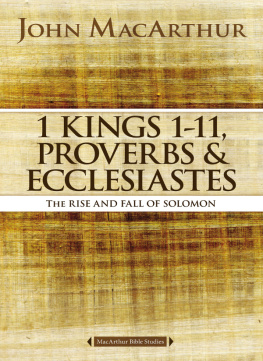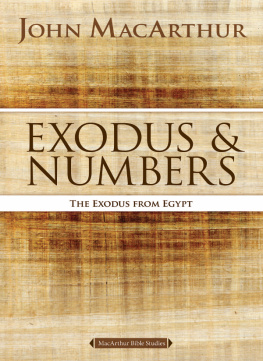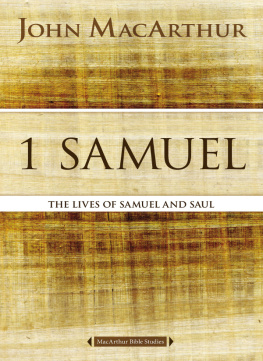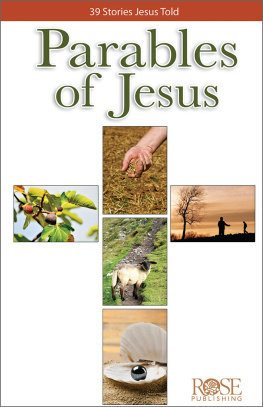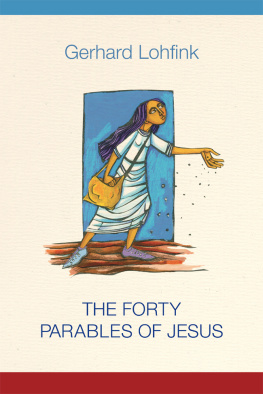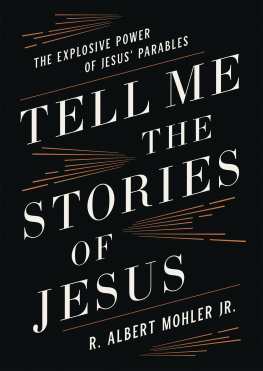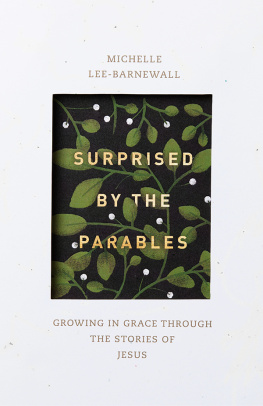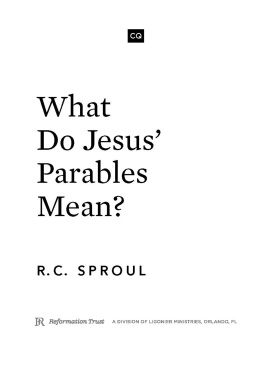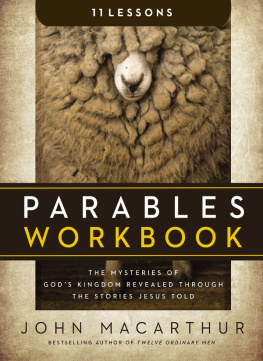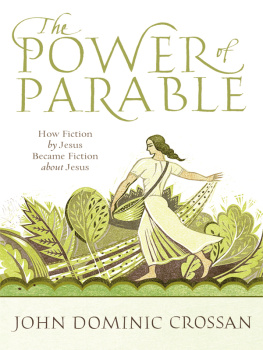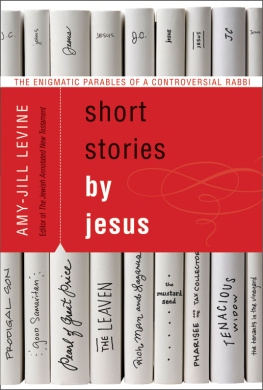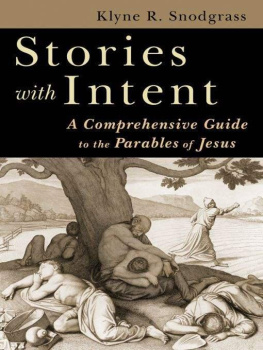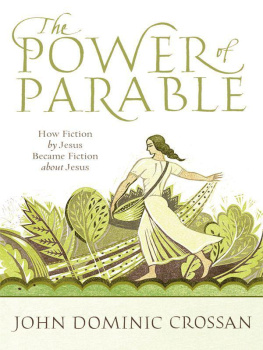Praise for Parables
An informative and helpful study for those desiring to penetrate into the meaning of a dozen of our Lords precious word pictures. Dr. MacArthurs treatment of justification by faith alone based on the parable of the tax collector and the Pharisee is outstanding.
Dr. Joel R. Beeke, president of Puritan Reformed Theological Seminary, Grand Rapids, Michigan
Everything you thought you knew about the parables is reoriented in this new work by John MacArthur to explain their meaning and show their relevance in the lives of believers. Teaching these vividly profound stories for those inside the kingdom of Christ, MacArthur argues that the parables do not reveal the truth to outsiders, but actually conceal it. Parables is intriguing and stimulating as it pierces through a thick cloud of exegetical misunderstanding about the illustrative teaching of Jesus. John MacArthur stands as a watchman on the ramparts, pointing us back to the protective refuge of Christ inside the walls of truth.
Steven J. Lawson, president of OnePassion Ministries and the Professor of Preaching, The Masters Seminary
After over 40 years of faithful pastoral ministry, John MacArthur has proven himself to be a sure guide through Scripture and a faithful expositor of Gods Word. This new book, Parables: The Mysteries of Gods Kingdom Revealed Through the Stories Jesus Told, is a rich biblical, theological, and devotional treatment of our Lords parables.
R. Albert Mohler, Jr., president of the Southern Baptist Theological Seminary
No one has given a more heroic and consistent defense of the authority and inspiration of Scripture in this generation than John MacArthur. I consider him one of the finest biblical expositors of our day. Few have given more careful attention to interpreting and applying the words of Jesus in the Gospels. I wholeheartedly recommend Parables as a landmark achievement by a beloved and seasoned pastor.
Dr. R. C. Sproul, founder and chairman of Ligonier Ministries
2015 by John MacArthur
All rights reserved. No portion of this book may be reproduced in any form without the written permission of the copyright owner, except for brief excerpts quoted in critical reviews.
Published in association with the literary agency of Wolgemuth & Associates, Inc.
Edited by Phillip R. Johnson
All Scripture quotations in this book, except those noted otherwise, are from the New King James Version. 1982 by Thomas Nelson, Inc. Used by permission. All rights reserved.
Quotations marked NASB are from the New American Standard Bible, 1960, 1962, 1963, 1968, 1971, 1972, 1973, 1975, 1977, 1988, and 1995 by The Lockman Foundation, and are used by permission.
Quotations marked KJV are from the King James Version of the Bible, public domain.
Quotations marked ESV are from THE ENGLISH STANDARD VERSION. 2001 by Crossway Bibles, a division of Good News Publishers.
ISBN: 978-0-7180-4208-0 (IE)
ISBN: 978-1-4002-0350-5 (eBook)
Library of Congress Cataloging-in-Publication Data
MacArthur, John, 1939
The parables of Jesus : Jesus' theology of salvation in stories / John MacArthur.
pages cm
Includes bibliographical references and index.
ISBN 978-1-4002-0348-2
1. Jesus Christ--Parables. I. Title.
BT375.3.M33 2015
226.8'06--dc23
2014040263
15 16 17 18 19 RRD 6 5 4 3 2 1
To Marshall Brackin, a loyal friend who personifies the apostle Pauls admonition in 1 Corinthians 16:1314: Be on the alert, stand firm in the faith, act like men, be strong. Let all that you do be done in love.
Contents
Jesus parables were ingeniously simple word pictures with profound spiritual lessons. His teaching was full of these everyday stories. Some of them were no more than fleeting remarks about commonplace incidents, objects, or persons. In fact, the most compact of all Jesus short stories does not even fill a complete verse of Scripture. It is found in Matthew 13:33: The kingdom of heaven is like leaven, which a woman took and hid in three measures of meal till it was all leavened. In the original Greek text, that parable is just nineteen words. It is the most ordinary of anecdotes about the most common of activities told in the fewest possible words. But it contains a profound lesson about the mysteries of the kingdom of heaven. Like all Jesus parables, it captivated His hearers and has sustained the interest of Bible students for two thousand years.
Jesus was the master storyteller. There is not a truism so familiar or a doctrine so complex that He could not give it new depth and insight through the telling of a simple story. These narratives epitomize the plain, powerful profundity of His message and His teaching style.
Despite the popularity of the parables, both the method and the meaning behind Jesus use of these stories are frequently misunderstood and misrepresented, even by Bible scholars and experts in literary genre.
Many assume, for example, that Jesus told parables for one reason only: to make His teaching as easy, accessible, and comfortable as possible. After all, the parables were full of familiar featureseasily recognizable scenes, agricultural and pastoral metaphors, household items, and common people. This would naturally make His words simpler for His provincial audience to relate to and grasp. It was without question a brilliant teaching method, unveiling eternal mysteries for simple minds. Jesus parables certainly do show that even the simplest stories and illustrations can be effective tools for teaching the most sublime truths.
Some suggest that Jesus use of parables proves storytelling is a better method for teaching spiritual truth than didactic discourses or sermonic exhortation. Stories, they say, pack more punch than sermons. Want to make a point or raise an issue? Tell a story. Jesus did it.
Some go further still, contending that the default form of discourse in the church should always be narrative, not hortatory or didactic. They point to Mark 4:3334, which describes Jesus public teaching during the latter part of His Galilean ministry this way: With many such parables He spoke the word to them as they were able to hear it. But without a parable He did not speak to them. Therefore, the argument goes, storytelling should be every pastors preferred methodif not the only style of preaching we ever use. In the words of one writer:
A sermon is not a doctrinal lecture. It is an event-in-time, a narrative art form more akin to a play or novel in shape than to a book. Hence we are not engineering scientists; we are narrative artists by professional function.
Does it not seem strange to you that in our speech and homiletical training we seldom considered the connection between our work and that of the playwright, novelist, or television writer?... I propose that we begin by regarding the sermon as a homiletical plot, a narrative art form, a sacred story.
Indeed, that is precisely the kind of preaching that now dominates many evangelical and megachurch pulpits. In some cases, the pulpit is totally gone, replaced by a stage and a screen. The key people on the church staff are those whose main task is directing the drama team or the film crew. Declaring truth in propositional form is out. Whats now in vogue is telling storiesor acting them outin a way that encourages people to fit themselves into the narrative. Stories are supposedly more hospitable, more meaningful, and more genteel than brute facts or unambiguous truth claims.
That perspective on preaching has steadily gained acceptance for three or four decades, alongside other pragmatic church-growth strategies (a trend that I have critiqued elsewhere
Countless recent books on preaching have echoed that assessment, or something similar. The remedy? We are told again and again that preachers need to see themselves as storytellers,
Next page
